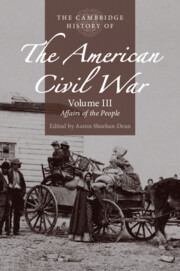Book contents
- The Cambridge History of the American Civil War
- The Cambridge History of the American Civil War
- The Cambridge History of the American Civil War
- Copyright page
- Contents
- Plates
- Figures
- Contributors to Volume III
- Note on the Text
- Part I Values
- Part II Social Experience
- Part III Outcomes
- 14 Making Peace
- 15 Reconstruction during the Civil War
- 16 Veterans and the Postwar World
- 17 The Civil War and the American State
- 18 The Civil War and American Law
- 19 The Civil War in Visual Art
- 20 The Civil War in American Thought
- 21 The Civil War in Literary Memory
- 22 The Civil War in Film
- 23 The Civil War in Public Memory
- Index
- Plate Section (PDF Only)
- References
23 - The Civil War in Public Memory
from Part III - Outcomes
Published online by Cambridge University Press: 11 October 2019
- The Cambridge History of the American Civil War
- The Cambridge History of the American Civil War
- The Cambridge History of the American Civil War
- Copyright page
- Contents
- Plates
- Figures
- Contributors to Volume III
- Note on the Text
- Part I Values
- Part II Social Experience
- Part III Outcomes
- 14 Making Peace
- 15 Reconstruction during the Civil War
- 16 Veterans and the Postwar World
- 17 The Civil War and the American State
- 18 The Civil War and American Law
- 19 The Civil War in Visual Art
- 20 The Civil War in American Thought
- 21 The Civil War in Literary Memory
- 22 The Civil War in Film
- 23 The Civil War in Public Memory
- Index
- Plate Section (PDF Only)
- References
Summary
By July 4, 1865, vestiges of the savage battle that had wrecked Gettysburg two years earlier were beginning to fade. On this first Fourth of July since peace, thousands descended once more on the small town, but this time veterans of the Army of the Potomac joined state dignitaries to lay the cornerstone for a soldiers’ monument in the national cemetery. Speaking to the somber crowd, Major General Oliver Otis Howard, commander of the XI Corps during the battle and commissioner of the Freedmen’s Bureau, declared that the memorial they now dedicated was raised to the Union soldier and his “unceasing herald of labor, suffering, union, liberty, and sacrifice.” “The maimed bodies, the multitude of graves, the historic fields, the monumental stones like this we are laying to-day,” he noted, “are only meager memorials of the soldiers’ work.”
- Type
- Chapter
- Information
- The Cambridge History of the American Civil War , pp. 481 - 505Publisher: Cambridge University PressPrint publication year: 2019



